#Communist Party’s Central Committee
Text
Analysis of Cuba’s Current Economic Crisis
“Cuba is going through the worst crisis it has experienced in decades, with widespread shortages of food and medicines, rolling blackouts and a sky-high 400% annual inflation rate. The calls on the communist leadership to open up the economy to the market are getting loud, even from close political allies.”[1]
“But deep divisions at the top of the regime regarding how much freedom to give the new…
View On WordPress
#Belarus#Carlos Alzugaray#China#Communist Party’s Central Committee#Communist Party’s Council of Ministers#Cuba#Cuba&039;s economic crisis#Cuban Communist Party#Cuban Communist Party’s Politburo#Cuban Interior Ministry#Cuban military#David Rockefeller Center for Latin American Studies (Harvard University )#Díaz-Canel#Fidel Castro#GAESA#John Kavulich#Prime Minister Marrero#Ramiro Valdės#Russis#U.S.-Cuba Trade and Economic Council
0 notes
Text
2018: Reform of Party and State Organizations [Chinese Language Wiki article]
Party building and strengthening the rule of the Chinese Communist Party were among the top projects of General Secretary Xi Jinping’s first decade in power. The Chinese language Wikipedia article 深化党和国家机构改革 (2018年) [Deepening the reform of Party and state institutions (2018)] gives an overview of the consolidation of the leadership of the Party including in some cases consolidating Party and…
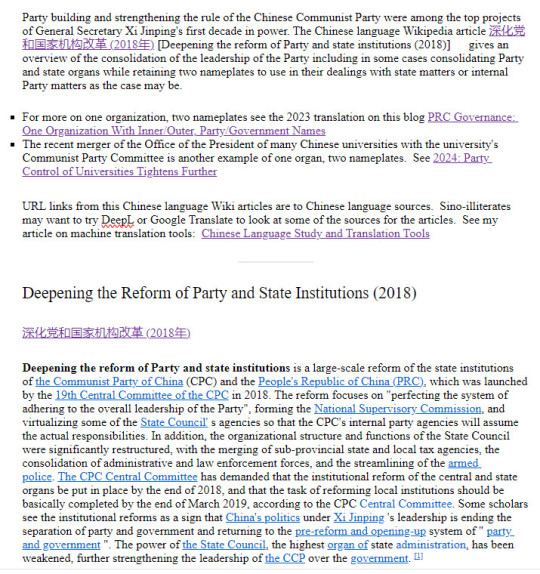
View On WordPress
#Central Committee#central government#China#Chinese#Communist Party#consolidation#government#leadership of the Party#local government#NPC#organizational structure#Party institutions#politics#PRC#reform#State Council#state institutions#共产党#中国
0 notes
Text

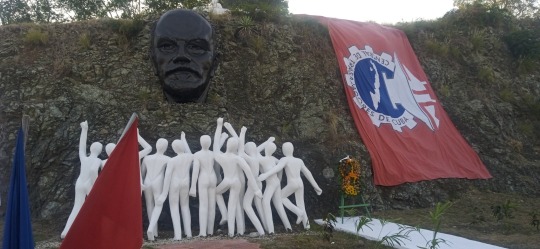



On April 22, 2024, hundreds of workers in Havana, on behalf of the Cuban working class, paid tribute to the leader of all workers of the world, Vladimir Ilyich Lenin, on the occasion of the 154th anniversary of his birth.
The traditional ceremony, which takes place every year on Lenin Hill, in the Havana municipality of Regla, was attended by members of the Politburo of the Communist Party of Cuba Central Committee, General Secretary of the Confederation of Cuban Workers Ulises Gilarte de Nacimiento, First Secretary of the Havana City Committee of the CPC Lebanon Izquierdo Alonso and Governor of Havana Yanet Hernandez Perez.
Via Communist World
269 notes
·
View notes
Text
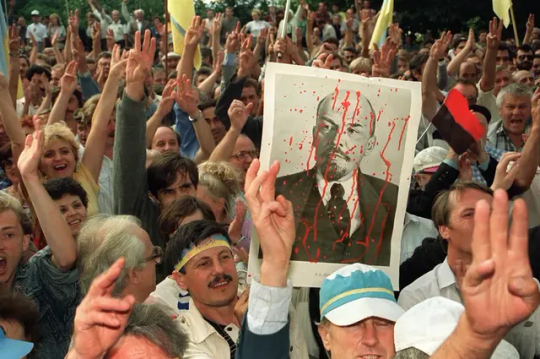
25th August 1991: Ukrainians demonstrate in front of the Communist Party's Central Committee headquarters in Kyiv the day after Ukraine declared its independence from the Soviet Union.
#ukrainian history#vintage ukraine#anti communism#russian colonialism#russia#lenin#soviet union#free ukraine#20th century#kyiv#ukraine#ussr#1990s#1991
240 notes
·
View notes
Text
The Communist Party’s main theoretical journal has laid out a new ideological framework for the financial system that emphasizes the primacy of China’s top leader and Marxist principles. [...]
The Communist Party issued a detailed ideological statement on Friday in Qiushi, the party’s main official theoretical journal, that made clear that it expected banks, pension funds, insurers and other financial organizations in China to follow Marxist principles [...]
The Qiushi paper, which was being closely studied by bankers and economists in China, could cut against efforts by Beijing to show that the economy is open to investment even as it places a heavier hand on business.
Barry Naughton, an economist at the University of California at San Diego who has long studied China’s transition to a market economy, said that the document signaled that the finance sector would be subject to ever-tighter oversight and forced to serve government policies more actively.
“The financial sector will not be expected to push for market-oriented reforms or even necessarily maximize profit,” he said. “As a program for the financial sector, it is ambitious, disappointing and somewhat ominous.”[...]
“Politics will for sure further dictate China’s finance, effectively moving China even closer to how it was before the reforms started in 1978,” said Chen Zhiwu, a finance professor at the University of Hong Kong.
Some of the policy targets set forth in the essay would not be unusual as regulatory goals in the West. For example, it calls for banks to emphasize financial services for the “real economy,” which the party has long interpreted to include ample financing for the country’s industrial base.
But it also calls for a strong role in finance for [...] Marxist ideology generally. That follows a pattern that emerged for other sectors during the national congress of China’s Communist Party a year ago, but has been less apparent in finance — until now. [...]
Moody’s, the credit rating agency, announced on Tuesday that it was lowering its credit outlook for the Chinese government to negative. It had previously assigned a stable outlook for the country’s credit rating, which remains at A1, near the top of the ratings scale. [...]
Qiushi is the main journal providing pronouncements on China’s current ideology, which is known as Xi Jinping Thought on Socialism with Chinese Characteristics for a New Era. The statement on Friday said that Mr. Xi’s speech to the financial conference, “is a valuable ideological crystallization formed by our party’s unremitting exploration of the path of financial development with Chinese characteristics.” [...]
“Politics affects all important areas, and economic or financial issues are themselves political issues,” he said. Indeed, Communist Party control over finance comes up repeatedly in the Qiushi statement. “We must unswervingly adhere to the centralized and unified leadership of the party Central Committee over financial work, uphold and strengthen the party’s overall leadership over financial work,” it said.
5 Dec 23
251 notes
·
View notes
Text
by Dion J. Pierre
The US House of Representatives has launched an investigation into 20 nonprofit organizations that are currently funding anti-Zionist student groups mounting pro-Hamas demonstrations on college campuses, an effort aimed at uncovering long suspected links to terrorist organizations and other hostile foreign entities.
As part of the inquiry, US Reps. Virginia Foxx (R-NC) and James Comer (R-KY) wrote to Treasury Secretary Janet Yellen on Tuesday, asking her to share any “suspicious activity reports” generated by the activities of Students for Justice in Palestine, Jewish Voice for Peace, American Muslims for Palestine, Tides Foundation, Rockefeller Brothers Fund, Bill & Melinda Gates Foundation, the Council on American-Islamic Relations, and other groups.
Foxx and Comer chair the House Committee on Education and the Workforce and the House Committee on Oversight and Accountability, respectively.
“The committees are investigating the sources of funding and financing for groups who are organizing, leading, and participating in pro-Hamas, antisemitic, anti-Israel, and anti-American protests with illegal encampments on American college campuses,” Foxx and Comer wrote in their letter to Yellen. “This investigation relates to both malign influence on college campuses and to the national security implications of such influence on faculty and student organizations.”
The inquiry comes amid widespread suspicion that an eruption of anti-Zionist protests on college campuses, in which students illegally occupied sections of section and refused to leave unless their schools agreed to condemn and boycott Israel, was fueled by immense financial and logistical support from outside groups. Foxx and Comer said in their letter that the investigation’s findings will inform recommendations for new federal laws requiring increased transparency and reporting of foreign contributions to American colleges and universities.
On Tuesday, Foxx told the Washington Free Beacon, which first reported the investigation, that the protests were a symptom of a larger threat to national security.
“It’s no coincidence that the day after the October 7 Hamas terrorist attack, antisemitic mobs began springing up at college campuses across the country,” Foxx said. “These protests have been coordinated and well organized, indicating that outside groups or influences may be at play. American education is under attack. It’s critical that Congress investigates how these groups — who are tearing apart our institutions — are being funded and advised before it’s too late.”
Foreign links to the anti-Zionist student movement have been the subject of numerous comprehensive studies.
Last week, the Network Contagion Research Institute (NCRI) published a report showing a connection between the anti-Zionist group Shut It Down for Palestine (SID4P) — a group formed immediately after Hamas’ massacre on Oct. 7 — and the Chinese Communist Party (CCP). NCRI explained that SID4P, which organized numerous traffic-obstructing demonstrations after Oct. 7, is an umbrella group for several other organizations which compose the “Singham Network,” a consortium of far-left groups funded by Neville Roy Singham and Jodie Evans. The report describes Singham and Evans as a “power couple within the global far-left movement” whose affiliation with the CCP has been copiously documented.
“The Singham Network exploits regulatory loopholes in the US nonprofit system to facilitate the flow of an enormous sum of US dollars to organizations and movements that actively stoke social unrest at the grassroots level,” the report said. “Alternative media outlets associated with the Singham Network have played a central role in online mobilization and cross-platform social amplification for SID4P.”
In 2022, the National Association of Scholars (NAS) revealed that one of the founders of Students for Justice in Palestine, Hatem Bazian, is also a co-founder of American Muslims for Palestine, an advocacy group which, NAS said, “retains ties to terrorist groups operating in the Palestinian Territories.”
NAS added that the Palestinian Campaign for the Academic Cultural Boycott of Israel — which has been influential is steering the boycott, divestment, and sanctions (BDS) movement against Israel in academia — is “structurally linked” to Palestinian terrorist organizations through the Council of National and Islamic Forces in Palestine — a member of the Palestinian BDS National Committee which comprises Hamas, the Popular Front for the Liberation of Palestine (PFLP), Popular Front-General Command, Palestinian Liberation Front, and Palestinian Islamic Jihad.
“On the one hand, BDS is designed to secure political legitimacy vis-á-vis Israel, with boycotts and divestment offering Palestinian activists and terrorists new domains to assert their cause,” NAS senior fellow Ian Oxnevad wrote. “On the other hand, BDS, along with the formation of multiple NGOs and nonprofit organizations, offers the Palestinians new avenues by which to access funding in a post-9/11 international financial system designed to curtail funding for terrorism.”
#anti-zionists#protests#students for justice in palestine#bds#virginia fox#james comer#investigation
51 notes
·
View notes
Text
"Like the other Arab Jews, the Jews of Iraq were considered a key population reservoir that could help tilt the demographic balance in Palestine in the Jews' favor. At a meeting in July 1943 of the Central Committee of Mapai, the dominant Jewish party (and forerunner of the Labor Party), one speaker put it this way: 'We can define our role with regard to this Jewry in one sentence: Zionist conquest of these Diaspora communities in order to liquidate them and transfer them to the Land of Israel.'
... Representatives of the Labor movement in the Zionist leadership believed it was urgent to infiltrate Iraq and establish a united Zionist movement there — not least to preempt attempts by the Revisionist movement or the Iraqi Communist Party to gain a foothold among Iraq's Jews. The Zionist activists who set up the Halutz movement in Iraq were ruthless in their efforts to oust emissaries who were not under the control of the Jewish Labor movement. Note that there was no local Zionist movement in Iraq to serve as a foundation on which the emissaries could build. The Jews of Iraq did not experience a Zionist 'awakening' and did not consider Palestine an attractive option. As early as 1941, Eliahu Epstein (Elath) of the Jewish Agency's Political Department met with a group of affluent Iraqi Jews who had fled to Tehran. However, he was unable to persuade them to settle in Palestine and invest their capital there. Some of them told him bluntly that they did not believe in Zionism. They explained that they had no intention of displacing the Arabs of Palestine, and that migration to Palestine was feasible only for Jews who were indigent or had relatives there.
... Among Iraq’s Jews there was a strong sympathy toward the local Communist Party, and many of the community’s young people were members of the party or of the Anti-Zionist League (AZL). For the most part consisting of well-to-do families, the Jews of Iraq understood the damage affiliation with Zionism could wreak on their social, economic, and political status; they drew a distinction between their Jewish identity and a Zionist identity. Those Jews who did leave Iraq settled mainly in Europe and North America, not Palestine."
Yehouda Shenhav, The Arab Jews: A Postcolonial Reading of Nationalism, Religion, and Ethnicity (2006)
116 notes
·
View notes
Text

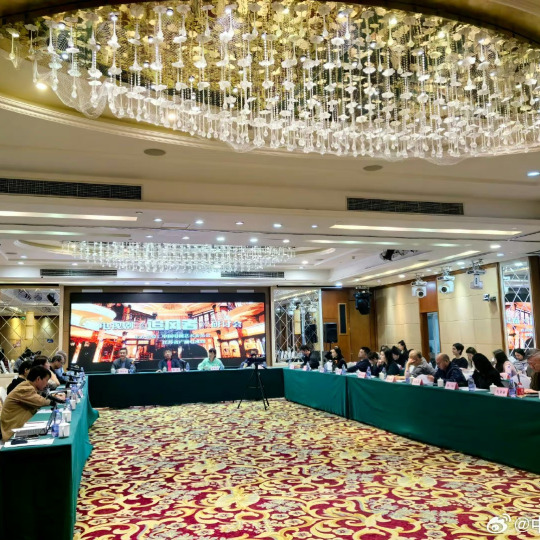
wang yibo - seminar on TV drama "War of Faith" held
On April 12, a seminar on the drama "War of Faith" sponsored by the China Television Arts Committee and Jiangsu Provincial Radio and Television Bureau was held in Beijing. The meeting was chaired by Yi Kai, Secretary General of China Television Arts Committee.
At the meeting, Tan Songzhi, director of the TV Drama Department of the Jiangsu Provincial Radio and Television Bureau, believed that the drama promoted the national spirit with patriotism as the core, pioneered and innovated in subject matter, techniques, and content, and provided rich opportunities for theme creation. Experience and inspiration demonstrate the enduring charm of classic narratives.
Ma Jun, deputy director of the TV Drama Project Department of the Film and Television Drama and Documentary Center of China Central Radio and Television Station, believes that the drama has a novel perspective, vivid characters and a clear theme. With faith as the soul, the protagonist's process of finding faith, establishing faith, and strengthening faith is described in detail, which is highly contagious. Let the audience, especially young audiences, receive patriotic education while understanding the history of the party and modern economic history.
Dai Ying, senior vice president of iQiyi and chief producer of the show, said that the show responds to the mood of the times, integrates traditional espionage themes with current audience needs, and resonates with the audience; it focuses on the experience and destiny of small people, and in financial espionage. A glimpse into the reality and complexity of human nature, arousing empathy from the audience. The drama has achieved good ratings in Taiwan, Thailand, Singapore, the United States, Indonesia and other regions. It has broken the user profile of previous spy dramas and significantly increased the proportion of young users and female users.
Long Qian, president of Ruyi Pictures and chief planner of the show, believes that the show is a carefully polished work of ingenuity, a reproduction and tribute to China's excellent traditional culture and the original mission of the Communist Party of China.
Zhang Shuwei, chief producer of Enlightenment Pictures and chief producer of the show, believes that the characters in the show are flesh and blood, and the characters have strong vitality, allowing the audience to feel the power of faith while being moved by the protagonist.
The chief director of the drama, Yao Xiaofeng, shared the process of creating the drama, as well as the details and gains during the filming, expressed the original intention of paying tribute to the faith, and hoped that through this work, the audience can feel the original intention of the Communist Party of China to serve the people.
The drama’s screenwriter Weng Liangping shared his creative ideas and expressed his creative ideas of revealing the inevitability of the KMT's defeat and showing that finance under the leadership of the Communist Party serves the people. He believes that the Chinese Communist Party leads the people to victory, which is the choice of history and the people.
article source.
41 notes
·
View notes
Text
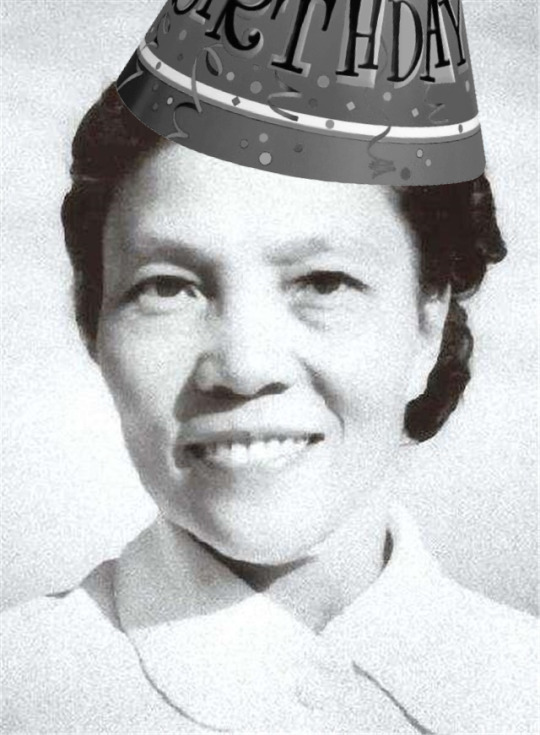
Happy birthday, Cai Chang! (May 14, 1900)
A prominent advocate of women's rights within the Communist Party of China, Cai Chang was born to a middle class family, and her mother instilled the value of women's autonomy in her from an early age, leaving her husband and supporting her children on her own. The sister of Cai Hesen, a close associate of Mao Zedong, Cai became similarly active in radical politcs. For much of her early life rejecting the concept of marriage, she would eventually marry Li Fuchun, another communist. Working in the Central Women's Committee during the period of the CPC-KMT alliance, Cai helped to draft the Marriage Decree of 1930, which established the necessity of free choice in marriage. After the People's Republic of China was established, Cai led the All-China Women's Federation and continued to work to advance the status of women in China until her death in 1990.
161 notes
·
View notes
Note
“ communist governments have always failed after killing millions of people”
The only communist government ever formed was Lenin’s Russia, which didn’t fail and killed no one.
Every other “communist” government was communist in name only and didn’t adhere to Marxist theory at all
Lenin started out by leading a violent coup. By which I mean he ordered his followers to attempt several violent coups, while he hid in safety far away from the killing, and the first few failed badly but eventually one managed to overthrow the Provisional Government.
The first thing that the Bolsheviks did was to try to legitimize themselves in the eyes of the people by moving forward with an election that the previous government had scheduled, confident that since The People loved them so much they would easily win the election, and from then on they could pretend to be legitimately elected instead of violent conquerors. They ended up with barely a quarter of the vote. So, naturally, Lenin declared that the election results couldn't possibly represent the true Will of The People and anybody who said otherwise must be a dangerous Counter-Revolutionary. This kinda sets the tone for everything that followed.
Then several other socialist parties, and many people within the Bolsheviks themselves, called for the creation of a coalition government to represent all the various interests and needs of the Russian people. Lenin rejected this and forcibly disbanded all other political groups to form a One Party State.
From there, major policies from Lenin include but are not limited to:
all land seized, to become government property
any media outlets which criticize the government were closed; this was initially presented as a temporary measure only needed in the earliest stages of the revolution, but remained in place through Lenin's death seven years later… and then the entire rest of the existence of the Soviet Union… and to a large extent to this day
abolished the legal system, replacing it with Revolutionary Tribunals which were instructed to ignore existing laws and instead decide people's fates based on a "socialist sense of justice" and the "revolutionary conscience". Within a few months this transitioned into the Red Terror, a campaign of executions killing at least 100,000 (in an official capacity, on top of all the local witch hunts and grudges), primarily targeting anybody suspected of opposing Lenin's rule, but also "social undesirables" such as prostitutes
called for the workers of each enterprise to elect their own local committees to monitor and manage their productivity… but then made those committees subservient to the trade unions, which in turn were made subservient to the Supreme Council of the National Economy, which sacrificed the interests of the workers and local economies in favor of the creation of a grand "centralized economic plan"
mandated that every citizen from the age of 16 to 50 must work full time
"the state is an institution built up for the sake of exercising violence. Previously, this violence was exercised by a handful of moneybags over the entire people; now we want to organize violence in the interests of the people." Strongly opposed any suggestion to abolish capital punishment, and continually emphasized the need for terror in "overthrowing the old order and ensuring the success of the revolution", even years after the revolution ended
ridiculed any socialist group around the world which sought a peaceful route to their goals, calling instead for the violent overthrow of all the "bourgeoisie" governments of europe… and for all the new communist nations created to submit themselves to the ultimate authority of the Bolsheviks
when accused by others within the Communist Party of making the new Russian State too centralized and bureaucratic while losing the trust of the working class, declared a ban on all "factional activity" within the party, on pain of expulsion
established concentration camps, in which 70,000+ political prisoners were used as slave labor
decreed that any "intellectuals" who were not already working for the Bolshevik government should be exiled to the most inhospitable parts of Russia
called for the execution of all "anti-Bolshevik" priests, killing at least 20,000 (mostly Orthodox Church, but also including Jews and Muslims)
when food shortages began in 1918, Lenin blamed them on peasant farmers supposedly hoarding grain, and established armed detachments to seize their food by force to redistribute to the cities, leading to widespread violence, social disorder, and public mass executions… and a dramatic decrease in food production, for reasons that should surprise nobody except a communist.
when a terrible drought began in 1921, Lenin continued to "requisition" all the products of the starving farmers, and then to export the majority of the grain to other countries instead of distributing it to his own people, resulting in roughly five million deaths by starvation alleviated only by the American Relief Administration
when Patriarch Tikhon called on Orthodox churches to sell unnecessary items to help feed the starving, responded by calling for all valuables belonging to religious institutions to be forcibly appropriated by the government, resulting in widespread violence
when starving peasants began resistance movements across Russia to oppose the government's seizure of their food, hundreds of thousands were directly killed by the Red Army while hundreds of thousands more were arrested and forced into slave labor.
So, did Lenin's government fail? Well, he initially gathered his support base with two fundamental assertions: first, that after the proletariat revolution the State would naturally "wither away" over time, leaving behind true and pure Communism. But every year after the revolution, his State seized more power for itself and perpetrated more violence upon any citizens who opposed totalitarian control. Second was the prediction that similar proletariat revolutions would take place across every nation in europe within a few months; this obviously never happened. So in terms of his own 'campaign promises', he was either lying about everything or failed on all counts.
In terms of the continued existence of the state he created, there are two possible interpretations. The first is that "Lenin's government" could not survive a single day after the man's death, and so lasted less than seven years before being replaced by a different government (using the same name) run by Stalin. In this case, Lenin's government failed after killing around seven or eight million people. The alternate interpretation, that the Soviet Union was lenin's government, means that it survived for an additional sixty-seven years… and killed an additional 50+ million people along the way, before failing in 1991. (For comparison, the total deaths in battle from all the wars of the 20th century add up to about 36 million.)
Either way, claiming that his government "didn’t fail and killed no one" is demonstrating a level of delusion that I have rarely seen.
The best thing I can say about Lenin is that he wasn't as bad as Stalin or Mao. He probably wasn't quite as bad as Hitler, but there's room for debate there. He was certainly worse than Pol Pot, Saddam Hussein, Idi Amin, and Ivan the Terrible put together.
1K notes
·
View notes
Photo

On this day, 27 July 1933, bus drivers in Havana went on strike, and other drivers soon walked out in sympathy. This was the start of the unrest that culminated in a general strike of Cuban workers and students that effectively shut down the nation and forced the brutal dictator Gerardo Machado from power. Machado made a last-minute deal with trade union leaders and the central committee of the Cuban Communist Party, claiming that they would be legalised and given government support if they ended the strike, but the agreement was rejected by workers, and the strike continued, even after police killed twenty demonstrators. On August 9, the military decided to stop supporting Machado, and two days later his government collapsed. Read this and hundreds of other stories in our book, Working Class History: Everyday Acts of Resistance & Rebellion, available here with global shipping: https://shop.workingclasshistory.com/products/working-class-history-everyday-acts-resistance-rebellion-book https://www.facebook.com/photo.php?fbid=668662698640282&set=a.602588028581083&type=3
93 notes
·
View notes
Text

Romanian citizens gesticulate as communist dictator Nicolae Ceausescu flees the Romanian Communist Party Central Committee headquarters. December 1989
33 notes
·
View notes
Text
I have not seen it yet in the current round of gun rights discourse, but i guarantee that at some point in the near future you will encounter ppl citing the quote from marx, “Under no pretext should arms and ammunition be surrendered; any attempt to disarm the workers must be frustrated, by force if necessary.” The context of this line, however—his 1850 address to the central committee of the communist league—is rarely shared alongside it, which is a pity bc the relevant background is illuminating
The address was presented in the aftermath of the German Revolution of 1848, a pan-german nationalist and anti-feudal revolution led by a combination of liberal bourgeois and radical socialist factions. Marx had earlier predicted a liberal victory, to be followed with a swift betrayal by the ascendant liberal powers of their erstwhile working class allies—a prediction he saw fulfilled in the extraction of sweeping liberal constitutional reforms under the auspices of the freshly formed National Assembly
The address presents a clear thesis articulated emphatically: in the wake of the joint liberal-radical victory, the bourgeoisie will attempt to reassert its political and economic hold over the German ppl, and the organised working class must refuse to let down their guard and instead press on to full victory in a genuine workers’ revolution. The text is invigorating, even at nearly two centuries’ remove from the conflict, and exudes both pride in the recent accomplishments of the league and violent optimism about its chances in the revolution’s looming second phase. His instructions are extensive and detailed: the workers must, for example, push for a centralised over a locally distributed government (the better to seize) and deny the liberals any compromise when they offer progressive legislative reforms, treating them as bribes and always demanding more extreme versions (so as to stoke conflict and inhibit acquiescence). This is the context in which he makes his remark about the working class’ refusal to give up arms: he anticipates that the new bourgeois government will soon try to disarm the militant socialist factions under the pretext of restoring internal peace (that is to say, from the communist point of view, securing their continued advantage in the unrelenting class war). The militant wing of the workers’ movement must resist this pacification.
There are a few things that stand out about this context, in contrast to that of contemporary USAmerican left radicals:
He is addressing a highly organised party to have recently demonstrated its mettle over the course of a national revolution
The revolution itself is either (depending on your pov) just ended or currently ongoing, meaning he is trying not to will a proletarian militia into existence but to preserve one already armed and alert
The injunction against disarmament comes as part of an extensive political and revolutionary programme tailored to the situation of the German working class in 1850, with clear strategic goals—one that notably includes core “reformist” and “statist” elements
It hardly requires elaboration that this is a very different context from marginal leftist communities in the US in 2023 conducting discourse about insurrectionary tactics on social media. The established prominence of the league and its recent victories are what give the speech any credibility in the first place, and it’s not hard to extrapolate Marx’s advice for a moment more like ours: you are deeply fucked and need to start from the ground up if you want to accomplish anything at all
It’s also worth pointing out that Marx’s interpretation of the 1848 revolution, upon which he bases these recommendations, is different from the received one with the benefit of historical hindsight. On his view, it was the first half of a war led by the liberal bourgeoisie and abetted by the communist elements of the working class, culminating in its triumph through the reforms of the National Assembly, to then be succeeded by either the propertied classes’ reigning victory or their violent socialist overthrow. On the now traditional view, the revolution was a failure, enfeebled by the fractures between liberal and radical segments, crushed by the conservative powers of the German aristocracies, and papered over by toothless concessions from the assembly that were retracted over the next few years. This should perhaps colour our assessment and application of the address
188 notes
·
View notes
Text
"It is crystal clear that once victorious, socialism can never tolerate the personality cult and its harmful consequences. The energetic measures taken by the Central Committee of the Communist Party of the Soviet Union to do away with the personality cult, and its consequence, set a brilliant example of unprecedented political boldness."
- Ho Chi Minh, "Development of Ideological Unity Among Marxist Leninist Parties" (August 3, 1956)
11 notes
·
View notes
Text

Jana Nakhal is a Marxist feminist organizer, urban activist and member of the Lebanese Communist Party's central committee
Returning to Foucault as he uses the concept of the panopticon. The panopticon is socially reproduced through the transformation of the women/queer people among themselves into a watchtower for the other. Through which they observe the other’s body, its size and shape, the hair that covers it, and pressures her to get rid of it or trim it, in acceptance of the male gaze, and internalizing the latter in the way women/queer people approach their own bodies.
In this context, it is important to see that what needs to be changed, the bodies that must be “improved,” are deficient bodies, in which there is a birth defect which must be constantly concealed, and its appearance monitored in order to preserve its “femininity.” Thus, the “process” of femininity is a process that alienates women from their bodies and makes them feel defective, while incapacitating them. Specifically, those who do not have the economic capacity, time, or any of the luxury and privileges required for this process.
The absence of public practices of torture and violence towards individuals who do not submit to patriarchal values related to the body does not mean that they are free with their bodies and practices. In reality, they are forced to face punishment of another kind. The demeaning of our curly hair, the frowning looks that face us when hair covers parts of our bodies that should not be covered, is only one form of this punishment.
Under patriarchy, the body is public property—particularly the body of colonized communities, of the trans and queer people, and women. That is, it is the property of society, the latter having the power to determine what it looks like, to control it, to dominate it, and to reject it when the body decides not to follow its standards. Hair is personal, intimate, or public. Hair also has a political structure, not because we want it to be so, but because colonialism and patriarchy made it so.
#marxism-feminism#Lebanese Communist Party#Jacques Lacan#Michel Foucault#continental philosophy#feminist theory#feminist phenomenology#feminist philosophy
11 notes
·
View notes
Text
"The first session of the 118th Congress was one of the least productive in the body’s history. Only 22 bills were signed into law this year by the president — by far the lowest total since at least 1993, the first year for which the National Archives have data. (For comparison, the next least productive year during this timespan was in 2013, when 72 bills became law.)
Despite the slow year, members nonetheless found time to introduce an abundance of bills relating to the threat of China, which was the focus of hearings in committees ranging from Financial Services to the Judiciary committee, and of legislation concerning everything from fentanyl distribution to TikTok.
In 2023, members introduced 616 pieces of legislation that contain a variation of the word “China” — more than 3.5 for every day that Congress was in session on average. That’s already more than any two-year congressional session, except for the 117th Congress (2021-2022; 860 bills) and the 116th (2019-2020; 620 bills), according to a search of the congressional record.
One of the few “accomplishments” in Congress this year was the formation of the Select Committee on the Strategic Competition Between the United States and the Chinese Communist Party — which was almost instantly dubbed the “tough on China committee” — in January."[...]
Members of Congress introduced at least nine bills aimed at restricting foreign ownership of agricultural land in the United States. As RS has explained, these efforts are not always logical, even if there are some legitimate national security concerns over China or other nations buying up farmland.[...]
Rep. Andy Ogles (R-Tenn.) and five co-sponsors introduced the “Defund China’s Allies Act” to “prohibit the availability of foreign assistance to certain countries that do not recognize the sovereignty of Taiwan,” aimed at 21 countries in Central America and the Caribbean. The bill argues that the “United States efforts to condemn these countries’ willing diplomatic shift toward a genocidal government is undermined by an incomprehensible adherence to the so-called ‘One China’ policy, on terms dictated by the Chinese Communist Party,” implicitly calling for an end to the policy that has maintained peace in the Taiwan Strait for decades.[...]
bills introduced by Sen. Marco Rubio (R-Fla.), Reps. John Curtis (R-Utah), and Chris Pappas (D-N.H.) [...] would have renamed the Taipei Economic and Cultural Representative Office (TECRO) in Washington, D.C. to the Taiwan Representative Office, because it “better reflects its status as Taiwan’s de facto diplomatic mission to the United States.”
That was only one of many bills that were purely symbolic and antagonizing, including one that demanded that Beijing “must be held financially liable for $16,000,000,000,000,” because of its responsibility in the outbreak of the Covid-19 pandemic and a resolution that declared China to be the biggest threat to freedom in the world.
“Whereas it is the opinion of Congress that the Chinese Communist Party is the greatest threat to freedom and to the free world,” reads the text, introduced by Rep. George Santos (R-N.Y.). “Be it Resolved by the House of Representatives (the Senate concurring), That Congress agrees that the Chinese Communist Party is the greatest threat to freedom and to the free world.” That’s the entire resolution.
27 Dec 23
101 notes
·
View notes